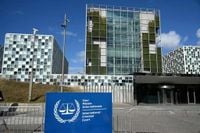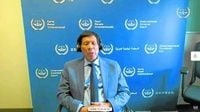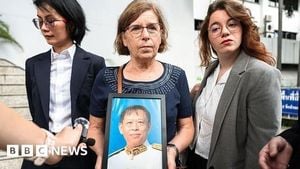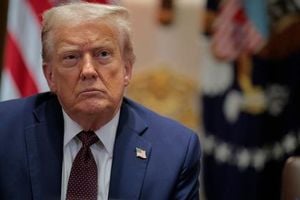The fate of former Philippine President Rodrigo Duterte continues to stir heated debate and political maneuvering, as the International Criminal Court (ICC) advances its case against him while controversies swirl in Manila over Senate interventions, welfare checks, and the possibility of new arrest warrants for other high-profile figures.
On October 3, 2025, the Philippine Coalition for the International Criminal Court (PCICC), an umbrella group of 17 human rights and civil society organizations, publicly condemned the Philippine Senate for passing a resolution urging the ICC to place Duterte under house arrest on humanitarian grounds. The resolution, supported by 15 senators, cited Duterte’s reportedly deteriorating health as a major factor. According to Philippine Star, the coalition charged that the Senate was “willing to put the welfare of a former head of State accused of crimes against humanity of mass murder over the welfare of thousands of common citizens – in particular, those living at constant risk of harm, intimidation, or retaliation for speaking out about these past crimes, and weathering this risk without material help, support, or even recognition from their elected representatives.”
The PCICC emphasized that the ICC operates independently, guided by the Rome Statute, and will determine the terms of Duterte’s detention based on its own rules—specifically articles 58(1) and 60(2)—which prioritize the gravity of alleged crimes, the danger to victims and witnesses, and the necessity of detention to prevent further offenses. The coalition called on the Philippine government to rejoin the Rome Statute and recommit to its international obligations, rather than lobbying for special treatment for Duterte. “The Senate as a duly elected body of representatives must continue to observe basic and fundamental human rights as mandated under our Constitution and bolstered by the Philippines’ obligations under international law,” the PCICC stated.
Yet, legal experts and advocates for the victims of Duterte’s “war on drugs” argue that the Senate’s resolution is largely symbolic and may even backfire. As Inquirer reported, lawyer Gilbert Andres of the Center for International Law said, “A house arrest is not even contemplated in the ICC Rome Statute. You won’t find it in the articles in the Rome Statute and it is also not in the [ICC] Rules of Procedure and Evidence.” Andres described the resolution as a domestic political gesture—one that reflects the Philippines’ penchant for granting “special treatment to politicians.”
Kristina Conti of the National Union of Peoples’ Lawyers added that the Senate is “not in any way involved in the ICC process,” and that the resolution only serves to demonstrate Duterte’s lingering political influence. Critics, including Karapatan secretary general Cristina Palabay, labeled the Senate “packed with Duterte lackeys and apologists,” particularly with Senator Ronald Dela Rosa—a former police chief and architect of Duterte’s anti-drug campaign—leading supporters of the house arrest proposal.
Senate Resolution No. 144, adopted on October 1, 2025, saw 15 senators vote in favor, including Dela Rosa, Robinhood Padilla, Rodante Marcoleta, Jinggoy Estrada, Christopher Go, Joel Villanueva, Sherwin Gatchalian, Loren Legarda, Erwin Tulfo, JV Ejercito, Panfilo Lacson, and Mark Villar. Three senators—Risa Hontiveros, Bam Aquino, and Francis Pangilinan—opposed, while Senate President Vicente Sotto III and Senator Raffy Tulfo abstained.
Meanwhile, the ICC has released a redacted Registry report, dated September 30 and made public on October 3, outlining how Duterte’s health will be managed in detention. According to the Manila Bulletin, the report recommends shorter daily sessions, adjustments to courtroom seating, and the option for Duterte to participate remotely if necessary. A medical officer will assess Duterte’s condition daily during confirmation of charges hearings, with findings submitted promptly to the Chamber, which will decide whether hearings proceed as scheduled or require delay.
Duterte’s defense had previously requested an indefinite adjournment, citing “cognitive impairment in multiple domains” and permanent unfitness for trial, invoking ICC Rule 135(4). However, the Pre-Trial Chamber directed the Registry to prepare a comprehensive medical report, despite the defense’s insistence that only an independent expert should conduct the evaluation. The Chamber retains sole authority to determine legal fitness to stand trial, with medical monitoring aimed at preserving Duterte’s ability to participate.
Historical precedent suggests that the ICC has typically adapted trial arrangements to accommodate defendants’ health, rather than granting indefinite suspensions. The cases of Laurent Gbagbo, Ratko Mladić, and Jean-Pierre Bemba all involved medical evaluations, but the tribunals ultimately allowed proceedings to continue with appropriate adjustments.
While the legal process unfolds in The Hague, political intrigue continues in Manila. Former senator Antonio Trillanes IV denied allegations that he visited Duterte at the ICC detention center to conduct a welfare check, telling GMA Integrated News, “I didn’t visit Duterte and it’s easy to know that since the policy in the ICC detention center was discussed to us.” Trillanes emphasized that Duterte has 24/7 telephone access and could have informed his family if such a visit had occurred.
Senator Robin Padilla had filed a resolution urging a Senate probe into whether Trillanes was officially designated by the Philippine government to conduct a welfare check, seeking clarification on the authority and mandate behind such a move. Vice President Sara Duterte expressed concern about an alleged welfare check conducted by the Philippine Embassy in The Hague, but the Department of Foreign Affairs clarified that such checks align with embassy functions under the Vienna Convention on Consular Relations and Philippine law to protect Filipinos abroad.
Adding to the uncertainty, Justice Secretary Jesus Crispin Remulla said the government has not made contingency plans for the possibility that the ICC might issue new arrest warrants, notably for Senators Ronald Dela Rosa and Christopher “Bong” Go. Remulla told reporters, “There is none yet. We have not talked about it.” He added that no warrants had been received, and that ICC arrest orders are typically enforced through Interpol and local law enforcement. Several cases involving Duterte’s arrest and potential turnover to the ICC remain pending before the Philippine Supreme Court.
Trillanes, who recently traveled to The Hague, suggested that the ICC could issue warrants for Dela Rosa and Go as early as 2026. Dela Rosa, who has been named as a potential co-perpetrator in ICC filings, said he is ready to face the ICC, while Go denied any involvement in Duterte’s anti-drug campaign.
The ICC has previously cited Dela Rosa’s role in directing police operations and promoting the “Davao model” nationwide, as well as his public admission that the drug war meant “killings in the name of drugs.” Legal experts note that parliamentary immunity does not shield lawmakers from international tribunals, raising questions about how the Senate would respond if one of its own were to become the subject of an ICC order.
As the legal and political drama continues, the outcome of Duterte’s case—whether he is placed under house arrest, remains in detention, or is found unfit to stand trial—will have profound implications for the Philippines’ reckoning with its recent history and for the international pursuit of accountability for crimes against humanity.





